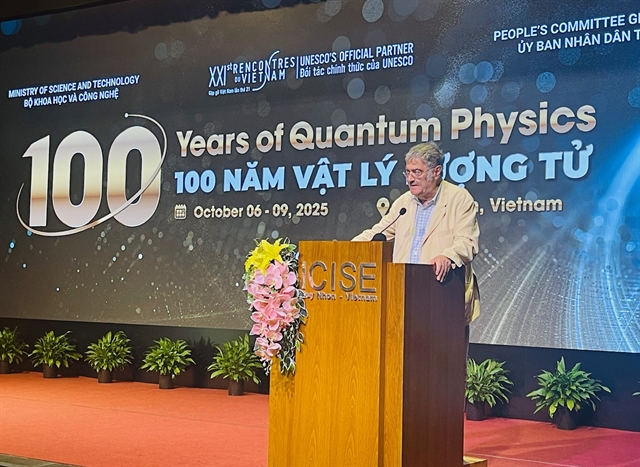
GIA LAI — Basic science and technological progress can only truly advance together through a harmonious combination of both, said French physicist Professor Serge Haroche, co-recipient of the 2012 Nobel Prize in Physics.
“This is the way research works, basic science being the fertile ground on which applications spring off, most often in an unexpected way. What is true for the inventions of the past will remain true in the years to come,” he told participants at the international conference 100 Years of Quantum Physics, which officially opened on Tuesday in Quy Nhơn Nam Ward, Gia Lai Province.
More than 80 professors, scientists and research fellows from 14 countries, along with 60 top-performing local students in maths, physics, chemistry and biology, are gathering for the four-day event.
Jointly organised by Rencontres du Vietnam (Meeting Vietnam) and the International Centre for Interdisciplinary Science and Education (ICISE), in collaboration with the International Organising Committee, the event holds major scientific significance as it celebrates the International Year of Quantum Science and Technology (IYQ). The occasion was proclaimed by the United Nations on June 7, 2024, marking 100 years of the development of quantum science.
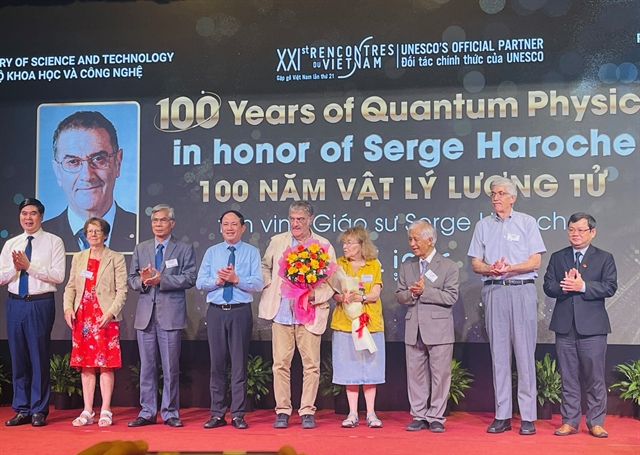 |
| Local authorities present flowers to Professor Serge Haroche and his wife to honour the professor for his outstanding and pioneering contributions to the field of quantum physics. |
The conference is also an occasion to honour Professor Haroche for his outstanding and pioneering contributions to the field of quantum physics. He is the 19th Nobel Laureate to visit Gia Lai Province and ICISE since the centre officially began operations in 2013.
Since then, ICISE founded by Vietnamese-French professors Trần Thanh Vân and Lê Kim Ngọc (Vân’s wife) has welcomed more than 16,500 scientists from over 60 countries and territories, including 19 Nobel Laureates and hundreds of the world’s leading researchers.
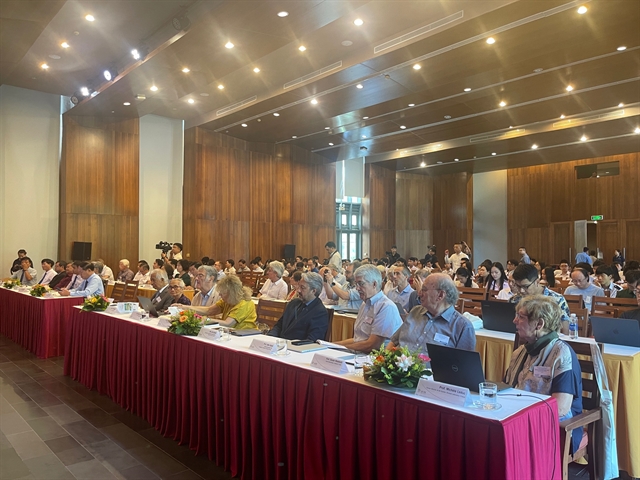 |
| Professors, scientists and research fellows from 14 countries across the world gather for the four-day event. |
According to Professor Haroche, quantum physics has changed our lives by leading to the invention of many devices such as the computer, the laser, the GPS, the mobile phone and the MRI, to name only a few. Without knowledge of the laws of the microscopic world of atoms, molecules and photons, these inventions would have been impossible.
“We must be aware of the fact that this knowledge was acquired through basic research, driven by the curiosity of scientists who just wanted to understand nature without any specific utilitarian goal in mind,” said the physicist.
“We have learned in our conversations with Việt Nam’s leaders in Hà Nội that the Vietnamese Government has the will to develop quantum technologies as part of a broader effort to strengthen the country’s economy. We wish Việt Nam great success in this project.”
The professor noted that Việt Nam has the human resources, including young people eager to learn and curious about the world.
“A good education at the elementary and high school level is of course a prerequisite to attract young minds towards science. Building up and sustaining over the years an efficient infrastructure of academic and private research will require strong and lasting financial support from the government and the private sector,” he said.
“We believe that a substantial part of the support given by the government should go to basic science because we never know which part of the knowledge it creates will lead to useful applications.”
“The main aim of ICISE is to create alternatives for worldwide scientists to return to Việt Nam and share the most recent scientific developments with their native colleagues. In a relaxed and open environment, we collect to spark new concepts and collaborations,” said Professor Vân.
Vân expressed his delight that this year marks a significant milestone for Vietnamese science after the Party General Secretary Tô Lâm initiated a revolutionary shift in thinking, placing science and technology at the core of national development, with the introduction of Resolution 57 in December 2024.
“We hope that this transformation will permit the youthful era to proceed their analysis inside Việt Nam, with no need to go overseas,” said Prof. Vân.
“It additionally opens the door for abroad Vietnamese expertise to return and contribute to their homeland, and for the nation to welcome main international scientists to assist practice and advance scientific growth, as envisioned by the General Secretary.”
Việt Nam’s Resolution No 57-NQ/TW on the advancement of science, technology, innovation and national digital transformation identifies quantum technology as one of the 11 top-priority technology groups, alongside artificial intelligence, semiconductors and other strategic fields.
“This is clear evidence of Việt Nam’s strategic commitment to developing a science- and technology-based economy, embracing digital transformation and being ready to invest in comprehensive scientific development across all domains, including basic science, applied science and interdisciplinary research,” said Deputy Chairman of the Provincial People’s Committee Lâm Hải Giang.
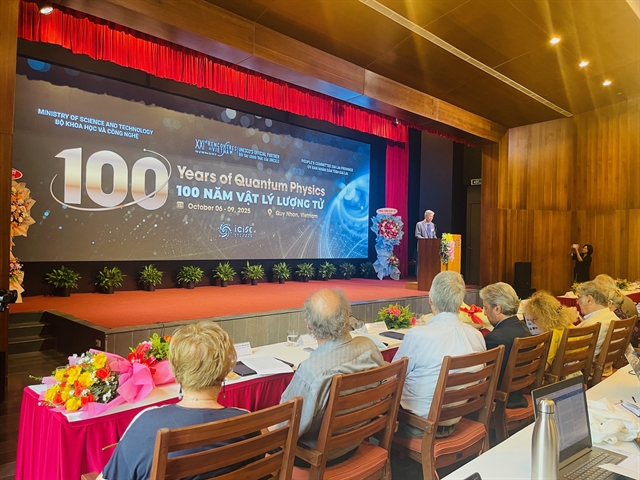 |
| Prof. Nguyễn Quang Liêm, President of the Vietnam Physical Society takes the floor. |
According to President of the Vietnam Physical Society Professor Nguyễn Quang Liêm, quantum science began as a radical departure from classical thought, taking shape in its proper form in the early 20th century, particularly with the birth of Quantum Theory 100 years ago, marked by groundbreaking contributions from Nobel Laureate physicists such as Albert Einstein, Niels Bohr, Louis de Broglie, Heisenberg, Born, Schrödinger, Dirac and many others.
“Quantum science has profoundly challenged our intuition, redefined our understanding of nature and given rise to technologies that now power our world, from semiconductors to quantum computers,” said Professor Liêm.
“This conference is a testament to the power of collaboration, showcasing the immense potential of quantum science to benefit global society. Through shared knowledge, open exchange and mutual respect, we build the future together.”
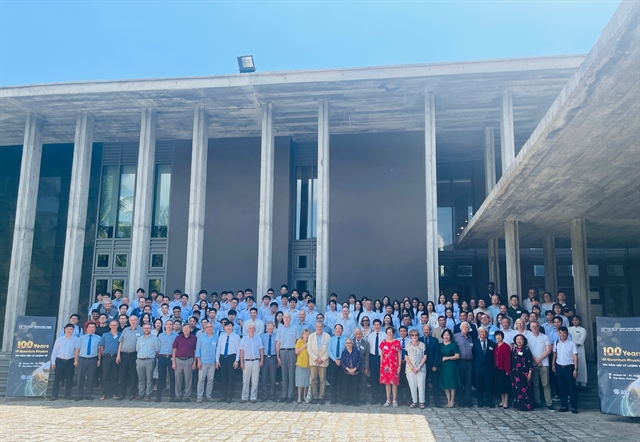 |
| Delegates pose for a group photo following the opening of the international conference “100 Years of Quantum Physics”. |
In addition to Professor Haroche, the convention additionally options displays by many of the world’s main audio system, notably: Professor Hans Bachor (Australian National University, Australia), Professor John Doyle (Harvard University, USA), Professor Alberto Bramati (Sorbonne University, France and National University of Singapore, Singapore), Professor Michel Brune (Collège de France, France), Professor Arno Rauschenbeutel (Humboldt University of Berlin, Germany), Professor Vahid Sandoghdar (Max Planck Institute for the Science of Light, Germany), Professor Claude Weisbuch (École Polytechnique, France), Dr Michele Leduc (French National Center for Scientific Research – CNRS, France), together with many different distinguished scientists.
The convention options over 40 scientific displays masking a variety of subjects, together with quantum optics, quantum communication and quantum computation; subjects the place condensed matter, atomic physics and chemical physics overlap; excessive precision experiments involving spectroscopy and metrology; chilly atoms and simulation of supplies; idea and strategies in quantum mechanics; quantum excessive vitality physics and cosmology; and quantum applied sciences and vitality manufacturing. — VNS
